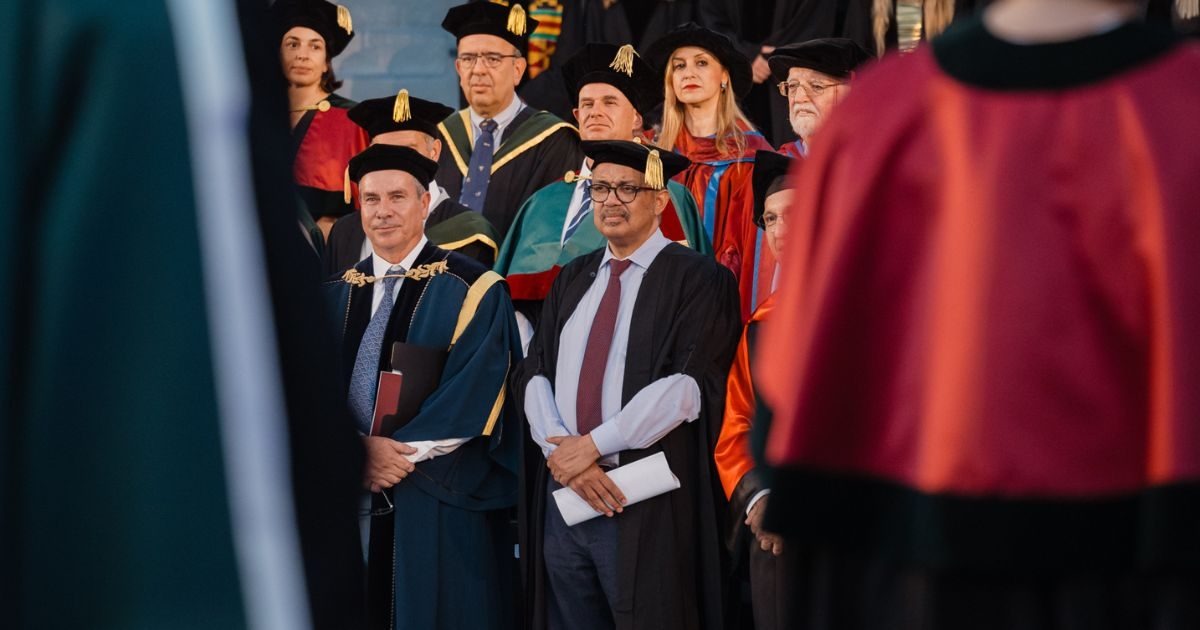During his first visit to Cyprus, Dr Tedros Adhanom Ghebreyesus was awarded an honorary Doctor of Medicine degree by the Medical School of the University of Nicosia
Dr Tedros Adhanom Ghebreyesus, Director-General of the World Health Organization (WHO), conveyed his commitment that the WHO will support the Cypriot government in every possible way to promote, provide, and protect the health of the island’s people.
Dr Ghebreyesus visited our country for the first time to attend the Graduation Ceremony of the Medical School of the University of Nicosia, which took place on Thursday, 27 June 2024, at the University of Nicosia Amphitheatre. During the graduation ceremony, Dr Tedros was awarded an honorary Doctor of Medicine degree.
This was the 10th graduation ceremony of the Medical School, attended by the Minister of Health, Mr Michalis Damianou, the Minister of Interior, Mr Konstantinos Ioannou, the Vice Chancellor of St George’s, University of London, Professor Jenny Higham, ambassadors from various countries in Cyprus, and other distinguished guests, as well as hundreds of relatives and friends of the graduates who travelled to Cyprus from all continents to attend the ceremony.
In his speech, Dr Ghebreyesus stated: “As we are in every country, WHO is committed to supporting the Government of Cyprus in any way we can to promote, provide and protect the health of the people of this island.” He also reminded that Cyprus has been hosting the newest of the 153 WHO country offices since last year.
Addressing the Minister of Health and other political and official figures, Dr Ghebreyesus urged them to actively support the discussions towards an international agreement to tackle pandemics (Pandemic Treaty): “If negotiations are completed by next May at the latest, as agreed, it would still be a giant achievement in very short time.”
Dr Ghebreyesus then expressed his admiration for “the range of careers for which this school is producing graduates”: “From clinical practice to public health and research,” he noted. “The simple truth is that there is no health without health and care workers.”
He emphasized the irreplaceable role of healthcare workers despite the advancements in artificial intelligence and other technologies: “The COVID-19 pandemic showed us just how important they are,” he said.
Concluding, Dr Ghebreyesus said: “WHO was founded 76 years ago, in 1948, as the world emerged from the devastation of the Second World War. Like the United Nations of which we are a part, WHO was born of the recognition that the only alternative to global conflict was global cooperation. Our Constitution was the first instrument of international law to affirm that the highest attainable standard of health is a fundamental right for all people, without distinction. A fundamental human right. Not a privilege for some, or for most; it’s a right for all. That is the right for which WHO will continue to work.”
Addressing Dr Ghebreyesus, Professor Andreas Charalambous, Executive Vice President of the Health Sector of the University of Nicosia, described his leadership in coordinating international efforts to combat the COVID-19 pandemic as “decisive”. “He has been a faithful defender of vulnerable populations, promoting gender equality and combating health-related stigma,” he noted.
“The awarding of this honorary title”, Professor Charalambous added, “highlights Dr Ghebreyesus’s visionary leadership, his dedication to health equity, and his significant impact on global health. His achievements are an inspiration to the international medical community and Public Health and embody the values supported by the University of Nicosia.”
In his own address to the graduates of the School, the Minister of Health, Mr Damianou, stated that Cyprus has emerged over the years as one of the leaders in higher education in the region:
“The University of Nicosia Medical School is one of the key contributors to this success.”
He continued by saying “I am confident that the Medical School of the University of Nicosia has provided the new graduates with all the necessary knowledge, skills, and tools to ensure a brilliant career in medicine. The medical community needs innovative ideas, a new era, new facilities. The graduates of the Medical School of the University of Nicosia are the professionals who can make a difference, further develop the profession, and expand knowledge.”
The Dean of the Medical School, Professor Adonis Ioannidis, referred to the School’s achievements and community service initiatives. He highlighted the School’s rich research work and publications, which significantly contribute to the University’s international rankings, and noted the exceptionally high employment rate of graduates.
The Rector of the University of Nicosia, Professor Philippos Pouyioutas, urged the graduates to adopt lifelong learning, to ethically utilise the disruptive technologies of artificial intelligence, and to become pioneers of technology. He encouraged them to be proud ambassadors of the University and to strive to bring about positive change in the world.
During the ceremony, Mr Panos Englezos, a significant figure in Cypriot public life who has made a decisive contribution to improving the lives of individuals with beta-thalassaemia and other hemoglobinopathies, was also awarded an honorary Doctor of Medicine degree.
Finally, the “Panos Englezos” honorary award, presented every two years by the Medical School and the International Thalassaemia Federation, was awarded to Dr Evangelia Giannaki, a distinguished scientist in heamatology, with an emphasis on the biology of heamatopoietic stem cells and regenerative medicine.
During the ceremony, the following degrees were awarded to the graduates: the MD (Doctor of Medicine), the MBBS (Bachelor of Medicine, Bachelor of Surgery), the Bachelor of Science in Biomedical Sciences, and the Master’s degrees in Family Medicine, Public Health, and Health Services Administration.
The ceremony concluded with the Hippocratic Oath recited by the graduates of the two medical programmes, MD and MBBS.



